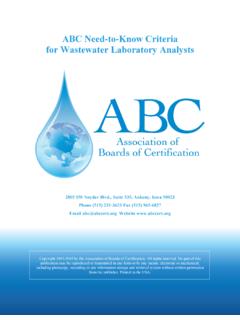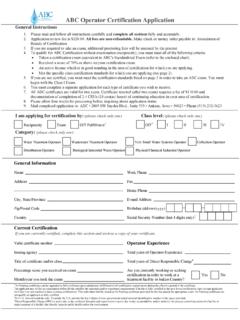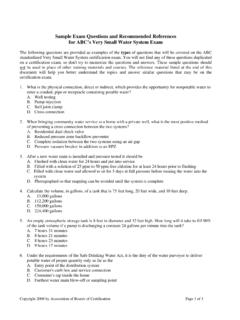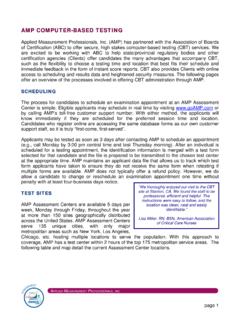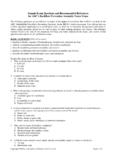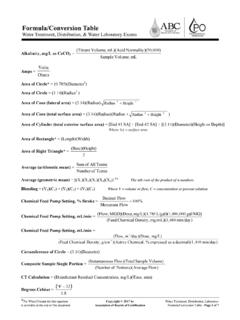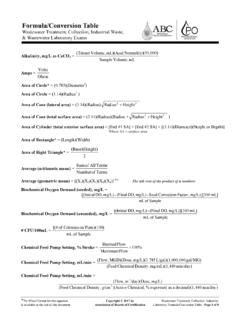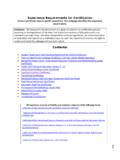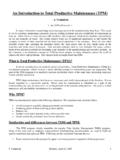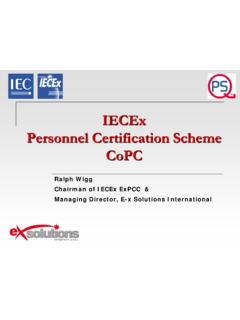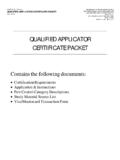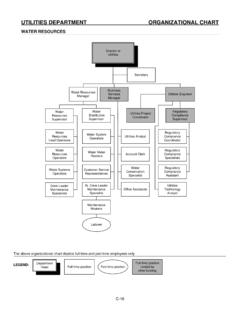Transcription of Very Small Water System Operators’ Guidebook to …
1 Very Small Water System Operators Guidebook to Preparing for Certification Prepared by: Association of Boards of Certification Publication Submitted to: Environmental Protection Agency Agreement Number X-980563-01-0 June 15, 2000 Table of Contents Introduction and Purpose of the Guidebook .. 1 Summary of the National Certification Guidelines .. 2 Need-to-Know Job Tasks and Capabilities .. 4 Exam Specifications .. 7 Sample Test Questions .. 8 References and Correct Answers .. 19 Training Opportunities and Resources.
2 24 State Certification Programs .. 25 Introduction and Purpose of the Guidebook 1 Introduction and Purpose of the Guidebook The purpose of this Guidebook is to help operators of very Small Water systems serving a maximum population of 100 understand the provisions and purpose of the Final Guidelines for the Certification and Recertification of the Operators of Community and Nontransient Noncommunity Public Water Systems. This Guidebook describes the certification requirements of the EPA Guidelines, operator need-to-know job tasks and capabilities, exam specifications, sample test questions, and additional information relating to operator training opportunities.
3 Summary of the National Certification Guidelines 2 Summary of the National Certification Guidelines The Final Guidelines for the Certification and Recertification of the Operators of Community and Nontransient Noncommunity Public Water Systems1 require that all community and nontransient noncommunity public Water systems have a certified operator in responsible charge. A community Water System is defined by the EPA as a public Water System that provides Water to at least 15 service connections used by year-round residents or regularly serves at least 25 year-round residents.
4 A nontransient noncommunity Water System is defined by the EPA as a public Water System that is not a community Water System and that regularly serves at least 25 of the same persons over six months per year (p. 5921, section IV). The objectives of the Guidelines are to ensure that: Customers of any public Water System be provided with an adequate supply of safe, potable drinking Water . Consumers are confident that their Water is safe to drink. Public Water System operators are trained and certified and that they have knowledge and understanding of the public health reasons for drinking Water standards (p.)
5 5919, section ). To achieve these objectives the EPA developed the following operator certification guidelines. Please note that the EPA guidelines are minimum requirements. States may impose more strict requirements so it is essential for operators to contact their State Certification Program listed in the last section of this Guidebook for specific state requirements. Regulations for Certification Each community and nontransient noncommunity Water System must be under the responsible charge of an operator certified at a level equal to or greater than the System classification.
6 This person has the authority to make decisions that affect Water quality or quantity. In addition, all operating personnel that make process control/ System integrity decisions about Water quality or quantity that affect public health must be certified (p. 5919, section ). A certified operator must be available during each operating shift. Requirements for Certification To become certified an operator must satisfy minimum education and experience requirements and pass the appropriate certification examination. The EPA minimum requirements for certification are: Education - The operator must possess a high school diploma or general equivalency diploma (GED).
7 States may allow experience and/or training to be substituted for the education requirement. Experience - The operator must meet the State s on-the-job experience requirement. Examination - The operator must pass a certification exam. The exam will cover the knowledge, skills, ability and judgment necessary to operate systems within the State. Current operators that do not meet these newly imposed requirements may be eligible to be grandparented through the State Certification Program. If grandparenting is allowed by the State Certification Program, operators may be permitted to become certified, with the System owner s consent, without meeting all of the certification requirements.
8 This is a restricted certificate and grandparented operators must meet all certification renewal requirements. Among other restrictions, the Guidelines specify that grandparenting is permitted only to existing operator (s) in responsible charge of existing systems which, because of State law changes to meet these guidelines, must for the first time have a certified operator . If allowed by the State, certification for the grandparented operator must be site specific and non-transferable to other operators. If the classification of the plant or distribution System changes to a higher level, then the grandparented certification will no longer be valid ; 1.
9 Environmental Protection Agency, 1999. Final Guidelines for the Certification and Recertification of the Operators of Community and Nontransient Noncommunity Public Water Systems. Federal Register, Vol. 64, No. 24 Friday, February 5, 1999. Summary of the National Certification Guidelines 3and if the grandparented operator chooses to work for a different Water System , he or she must meet the initial certification requirements of that System (p. 5920, section ). Renewal Operators that meet the certification requirements and pass the certification exam will be certified by the State Certification Program for a specific period of time.
10 The Guidelines require certificates to be renewed within a period of three years. Operators must attend State approved training in order to renew their certificates. Need-to-Know Job Tasks and Capabilities 4 Need-to-Know Job Tasks and Capabilities ABC conducted a very Small Water System operator job analysis to identify the most critical job tasks performed by operators and the capabilities required to competently perform these job tasks. Over 450 operators were surveyed by ABC as part of this process. In the survey, operators provided data on how frequently job tasks are performed and the potential seriousness of performing these tasks incorrectly.
